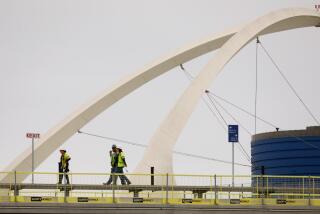Cubic Gets Nod on NYC Transit Contract Again
- Share via
SAN DIEGO — For the second time in four months, a New York Metropolitan Transportation Authority selection committee has recommended that San Diego-based Cubic Corp. be awarded the highly controversial contract to outfit New York subways and buses with an automatic fare-collection system.
If given final approval by the MTA board, Cubic’s $179-million bid will result in a three-year contract creating 300 new jobs at Cubic to outfit 69 of 469 New York subway stations and 3,780 MTA buses with card-activated fare-collection systems.
Contract add-ons and extensions to outfit the entire New York subway system could make the job worth more than $400 million to Cubic, a defense and high technology manufacturer. A decision by the full transit board could come as early as July 26, at the MTA’s regular board meeting.
But, based on history, an MTA board approval is no sure thing.
Cubic received a similar recommendation in March from a selection committee, only to have the MTA board throw the contract competition open to another round of bids in June after Cubic’s competitor, a joint venture of Nynex and France-based Alta, said it would “substantially improve” on its original price.
One Cubic executive labeled the rebidding a “travesty and a farce,” and the company filed suit in U.S. District Court in Manhattan to prohibit MTA from seeking new offers. But a federal judge declined to issue a temporary restraining order, and the rebidding went ahead on July 9.
However, Cubic’s revised $179-million bid for the first phase of the automatic fare collection system still turned out to be $32 million less than the $211-million bid submitted by Nynex-Alta for a “comparably equipped system,” MTA spokesman John Cunningham said Wednesday.
“The systems technologies that each company proposed were essentially rated equal by the selection committee. That being the case, Cubic got the recommendation,” Cunningham said. The dramatic reduction promised by Nynex hinged on the MTA revising its bid specifications, which the MTA declined to do, Cunningham said.
After saying earlier this month that it would not lower its price in the rebidding, Cubic spokesman Jerry Ringer said it decided to slash $9 million off its new bid, figuring that it would have spent at least that much in litigation to contest an unfavorable result in a rebidding. Nynex-Alta lowered its proposal in the rebidding from $224 million to $211 million.
“Cubic came in with the same exact proposal for $9 million less, and so we’re pleased that we will be spending less money, assuming that MTA board approves the contract, and that remains to be done,” Cunningham said.
Nynex officials in White Plains, N.Y. were unavailable for comment Wednesday.
The new fare-collection systems include Cubic’s high-tech turnstiles featuring security bars and computer-driven gates that are designed to foil the legions of New York subway “fare-beaters.”
The MTA estimates that fare evasion in the city costs the transit authority $60 million to $100 million each year in lost fares. Last year, the system took in about $1.5 billion in fares, Cunningham said.
“The past five weeks have been a nightmare, and we are looking ahead, not back,” Cubic’s Ringer said. “We want to get on with providing the New York commuters and taxpayers with the best fare-collection system in the world.”
The contract calls for Cubic to immediately begin installing 2,100 token-only turnstiles at 69 New York subway stations and upgrade them gradually with card-based automatic fare electronics. Cubic will also install card-based automated fare systems for 3,780 MTA buses.
To fill the contract, Cubic expects to hire 200 new employees in San Diego and 100 in the New York area, Ringer said.
More to Read
Sign up for Essential California
The most important California stories and recommendations in your inbox every morning.
You may occasionally receive promotional content from the Los Angeles Times.










